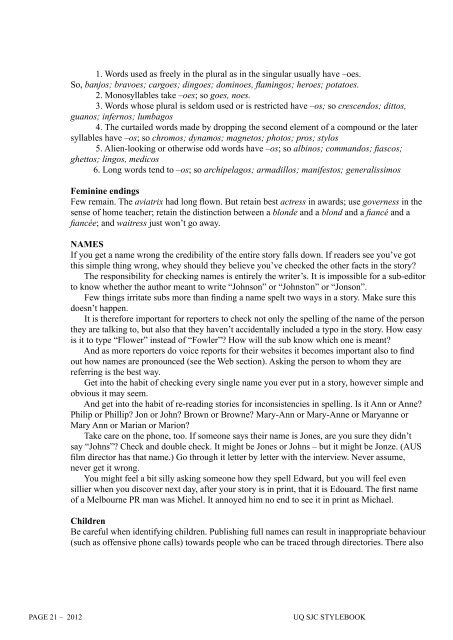Create successful ePaper yourself
Turn your PDF publications into a flip-book with our unique Google optimized e-Paper software.
1. Words used as freely in the plural as in the singular usually have –oes.So, banjos; bravoes; cargoes; dingoes; dominoes, flamingos; heroes; potatoes.2. Monosyllables take –oes; so goes, noes.3. Words whose plural is seldom used or is restricted have –os; so crescendos; dittos,guanos; infernos; lumbagos4. The curtailed words made by dropping the second element of a compound or the latersyllables have –os; so chromos; dynamos; magnetos; photos; pros; stylos5. Alien-looking or otherwise odd words have –os; so albinos; comm<strong>and</strong>os; fiascos;ghettos; lingos, medicos6. Long words tend to –os; so archipelagos; armadillos; manifestos; generalissimosFeminine endingsFew remain. The aviatrix had long flown. But retain best actress in awards; use governess in thesense of home teacher; retain the distinction between a blonde <strong>and</strong> a blond <strong>and</strong> a fiancé <strong>and</strong> afiancée; <strong>and</strong> waitress just won’t go away.NAMESIf you get a name wrong the credibility of the entire story falls down. If readers see you’ve gotthis simple thing wrong, whey should they believe you’ve checked the other facts in the story?The responsibility for checking names is entirely the writer’s. It is impossible for a sub-editorto know whether the author meant to write “Johnson” or “Johnston” or “Jonson”.Few things irritate subs more than finding a name spelt two ways in a story. Make sure thisdoesn’t happen.It is therefore important for reporters to check not only the spelling of the name of the personthey are talking to, but also that they haven’t accidentally included a typo in the story. How easyis it to type “Flower” instead of “Fowler”? How will the sub know which one is meant?And as more reporters do voice reports for their websites it becomes important also to findout how names are pronounced (see the Web section). Asking the person to whom they arereferring is the best way.Get into the habit of checking every single name you ever put in a story, however simple <strong>and</strong>obvious it may seem.And get into the habit of re-reading stories for inconsistencies in spelling. Is it Ann or Anne?Philip or Phillip? Jon or John? Brown or Browne? Mary-Ann or Mary-Anne or Maryanne orMary Ann or Marian or Marion?Take care on the phone, too. If someone says their name is Jones, are you sure they didn’tsay “Johns”? Check <strong>and</strong> double check. It might be Jones or Johns – but it might be Jonze. (AUSfilm director has that name.) Go through it letter by letter with the interview. Never assume,never get it wrong.You might feel a bit silly asking someone how they spell Edward, but you will feel evensillier when you discover next day, after your story is in print, that it is Edouard. The first nameof a Melbourne PR man was Michel. It annoyed him no end to see it in print as Michael.ChildrenBe careful when identifying children. Publishing full names can result in inappropriate behaviour(such as offensive phone calls) towards people who can be traced through directories. There alsoPAGE 21 – <strong>2012</strong>UQ <strong>SJC</strong> STYLEBOOK


